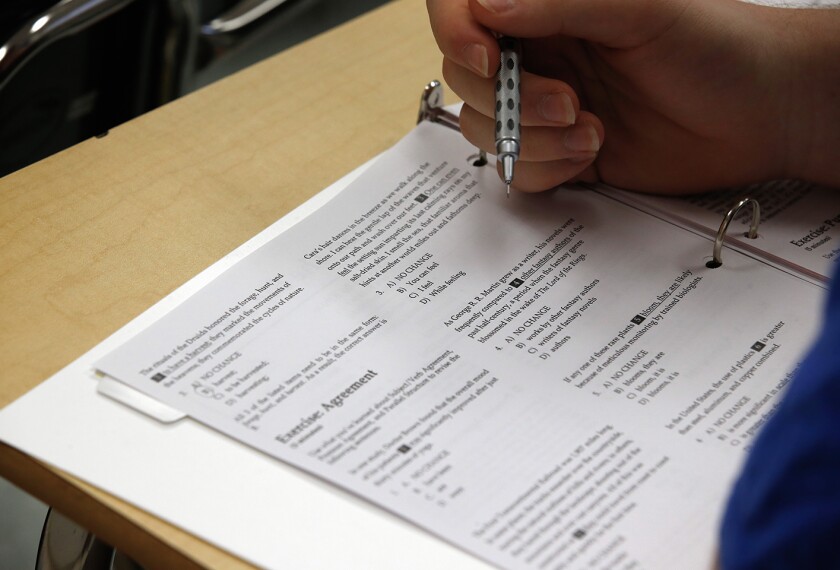The Oakland, Calif.-based legal team of Disability Rights Advocates is taking its crusade north to Alaska, where the group filed a lawsuit this month to make the state’s mandatory high school exit exam more accessible to students with special needs.
The nonprofit organization previously filed similar lawsuits in California and Oregon over the tests students in those states had to pass in order to graduate. At issue in the Alaska case—as well as the others—is how many accommodations the state allows a special education student to have while taking the test.
“We’d like for the state to make sure that the way they administer the test is fair” to students with disabilities, said Monica Goracke, a lawyer with DRA.
Ensuring that students—and adults—with disabilities have equal access to such basic rights as education, public transportation, health insurance, and housing has been the goal of Disability Rights Advocates since 1993 when lawyer Sid Wolinsky started the group.
Today, 11 lawyers and 24 other employees work for the group, which has a caseload of about 80 class actions around the country. Roughly one-third of the cases are education-related.
Disability Rights’ work has resulted in new and rigorous alternative assessments for students with disabilities, and “they have pushed the envelope in our thinking about what we are doing in terms of accommodations,” said Martha Thurlow, the director of the National Center on Educational Outcomes at the University of Minnesota-Twin Cities.
The lawsuit the group filed March 16 in Alaska was prompted by calls from parents and disability-rights advocates there. They expressed concern that more than 500 students with special needs are in danger of not receiving high school diplomas because they failed the state’s exit exam. The complainants maintain that the students were not given the accommodations called for in their individualized education plans, or IEPs, according to Mr. Wolinsky.
For example, one prohibited accommodation is the read-aloud option in which an educator reads a test question out loud to the test-taker. “A blind student who can’t read Braille can’t graduate from high school in Alaska,” Mr. Wolinsky said.
So far, it seems that education policymakers in Alaska are willing to play ball. Mr. Wolinsky spent two hours discussing his concerns with officials from Attorney General Gregg Rankes’ office last week.
“I am largely optimistic that we will be able to reach a solution,” Mr. Wolinsky said of a possible out-of-court agreement.
‘A Better Life’
In addition, the state’s department of education is “reviewing the suit, looking at the laws and regulations, and trying to work through these issues in a manner that is fair to all involved,” said Harry Gamble, a spokesman for the Alaska state education department.
The exit-exam cases in Alaska, California, and Oregon share the same four “deficiencies,” Mr. Wolinsky said.
Each state, he contends, failed to establish consistent policies regarding what accommodations students with special needs could have on the tests. “There is absolutely no rhyme or reason as to what [the states] designated as a reasonable accommodation and what they prohibit,” he said.
In addition, appropriate alternative tests have not been provided to youngsters with disabilities in those states, as required by federal law, and the tests themselves were not valid in many cases because the students were not taught the material covered in the assessment, Mr. Wolinsky charged.
Finally, “mass confusion” reigns over the state’s policies, he said: “They’ve vacillated, changed, tinkered with, and altered policies as they went along.”
In California, a federal judge issued a preliminary injunction that backed the DRA suit. While that injunction was under appeal by the state, California postponed its graduation-exam requirement until 2006.
Consequently, the U.S. Court of Appeals for the 9th Circuit in San Francisco dismissed the lawsuit, said Michael Hersher, the assistant general counsel for the state’s department of education.
California has recently made changes to the accommodations and alternative assessments special education students are entitled to, Mr. Hersher said. Because those measures are in place, “it is pretty clear that if [a special education student] fails, it won’t be because of their disability; it will be because they don’t know the content,” he said.
In Oregon, the first of the three lawsuits, filed in 1999, was settled by the state, which agreed to change its accommodations policies. Mr. Wolinsky said that victory was largely the result of the work of a group of five specialists whom he referred to as a “blue-ribbon panel” of experts on assessment and special education.
Putting together a group of independent, well-known experts to address specific issues is a “signature method of settlement for DRA,” Mr. Wolinsky said. In fact, the legal team was so impressed with the panel’s analysis of how best to assess students with disabilities that it published the team’s report, “Do No Harm,” which is now distributed through the DRA’s Web site, www.dralegal.org.
As part of the settlement, Oregon expanded the accommodations students with disabilities could receive on the exit exam and created alternative assessments, Mr. Wolinsky said.
“It was a happy resolution for everybody,” he said.
Disability Rights Advocates did not seek damages in any of the three cases. Said Mr. Wolinsky, “We’re just trying to make a better life for these children.”




